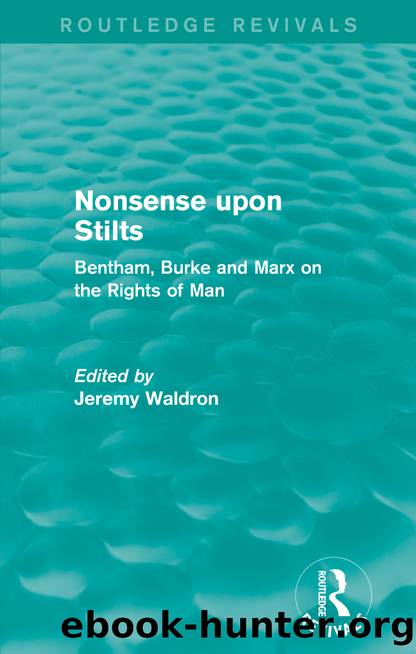Nonsense Upon Stilts (Routledge Revivals): Bentham, Burke and Marx on the Rights of Man by Jeremy Waldron

Author:Jeremy Waldron [Waldron, Jeremy]
Language: eng
Format: epub
Tags: Political Ideologies, Political Science, General, Human Rights
ISBN: 9781317587224
Google: wFSvBAAAQBAJ
Goodreads: 23369987
Publisher: Routledge
Published: 1987-01-01T00:00:00+00:00
II
The vulgar Marxist line on human rights is well known. It is that, in their traditional formulations, doctrines of rights present the preoccupations of the bourgeois capitalist individual as though they were universal and compelling principles of human nature. In their content, the alleged rights of man are said to reflect the wish of the capitalist entrepreneur to be free from social restriction and responsibility, and free of any concern for the welfare (or even the freedom) of those whom he exploits. The right to liberty, the right to property, the right to personal security, and the right to resist any government that gets in the way of bourgeois activity â these are all rights whose fundamental orientation is towards the selfish desires of the acquisitive individual. Marxists will also argue that bourgeois ideology permeates not just the content but the very form of rights. The form is individualistic: it presupposes that the potential for conflict between individuals in the society will always be so great that each person needs some coercively maintained guarantee that the acts of others will not imperil the pursuit and fulfilment of her interests. Furthermore, the abstraction of rights-principles commits us to an artificial and legalistic myopia: it allows us to neglect the differences and inequalities that matter in the world, between those who have and those who do not have control over the means of production. With this form and this content, human rights may be fit for the life of capitalist society; but, it is maintained, they will have no place in the harmonious communism to which capitalism and the lower phase of socialism will eventually give way.
Many of Karl Marxâs arguments in âOn the Jewish Questionâ appear to support this version of the Marxist view of rights. When he discusses what the French Declaration of 1793 had taken as the fundamental rights of man â liberty, property, security and equality â Marx commented that âthe so-called rights of man ⦠are nothing but the rights of the member of civil society, i.e. egoistic man, separated from other men and from the communityâ (p. 145). According to Marx, man as a member of civil society is man acting within the forms of capitalist industry and capitalist economy â a private individual pursuing material gain in a context where all his relations with others are mediated by the market and commodity exchange. The suggestion is that the rights of man, though they purport to be universal or even ânaturalâ in character, are rights which make sense only in relation to that particular phase of social and economic organization.
In his book Marx and Justice Allen Buchanan has argued that in saying the rights of man were ânothing butâ the rights of egoistic man, Marx meant that such rights were âvaluable only forâ egoists in this social context.24 There are, I think, slight problems with this interpretation. It is true that Marx believed rights would be pursued only by people of that sort and in that context: other people in other forms of society would not see the point of these concerns.
Download
This site does not store any files on its server. We only index and link to content provided by other sites. Please contact the content providers to delete copyright contents if any and email us, we'll remove relevant links or contents immediately.
What's Done in Darkness by Kayla Perrin(25501)
Shot Through the Heart: DI Grace Fisher 2 by Isabelle Grey(18220)
Shot Through the Heart by Mercy Celeste(18160)
The Fifty Shades Trilogy & Grey by E L James(17777)
The 3rd Cycle of the Betrayed Series Collection: Extremely Controversial Historical Thrillers (Betrayed Series Boxed set) by McCray Carolyn(13190)
The Subtle Art of Not Giving a F*ck by Mark Manson(12916)
Scorched Earth by Nick Kyme(11834)
Stepbrother Stories 2 - 21 Taboo Story Collection (Brother Sister Stepbrother Stepsister Taboo Pseudo Incest Family Virgin Creampie Pregnant Forced Pregnancy Breeding) by Roxi Harding(11041)
Drei Generationen auf dem Jakobsweg by Stein Pia(10218)
Suna by Ziefle Pia(10186)
Scythe by Neal Shusterman(9265)
International Relations from the Global South; Worlds of Difference; First Edition by Arlene B. Tickner & Karen Smith(8614)
Successful Proposal Strategies for Small Businesses: Using Knowledge Management ot Win Govenment, Private Sector, and International Contracts 3rd Edition by Robert Frey(8419)
This is Going to Hurt by Adam Kay(7699)
Dirty Filthy Fix: A Fixed Trilogy Novella by Laurelin Paige(6454)
He Loves Me...KNOT by RC Boldt(5805)
How to Make Love to a Negro Without Getting Tired by Dany LaFerrière(5378)
Interdimensional Brothel by F4U(5305)
Thankful For Her by Alexa Riley(5164)
